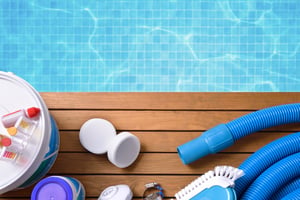 It’s that time of the year where school is almost out for summer. But before that final bell rings, papers are thrown in the air, and excited kids exit the halls until fall, is your pool ready for a long, hot, busy summer? For the health and safety of your pool, and your guests an effective maintenance plan is necessary. If you have a new pool, are new to owning a pool, or just need a quick refresher on how to care for the water and equipment, you may want to consider enrolling in Pool School before class is dismissed.
It’s that time of the year where school is almost out for summer. But before that final bell rings, papers are thrown in the air, and excited kids exit the halls until fall, is your pool ready for a long, hot, busy summer? For the health and safety of your pool, and your guests an effective maintenance plan is necessary. If you have a new pool, are new to owning a pool, or just need a quick refresher on how to care for the water and equipment, you may want to consider enrolling in Pool School before class is dismissed.
Pool school is a service offered by Lucas Firmin Pools. If your pool is built by Lucas Firmin Pools, these classes are complimentary immediately after your pool is finished; but if you have an existing pool, these lessons and instructions are still available for a nominal hourly fee. So what will you learn in Pool School? The three C’s.
Circulation
Understanding and maintaining your pool’s circulation system is critical for clean and clear water. Your pool’s pump and filtration system is responsible for this. How often you run your pump will depend on the size of your pool and the type of pump that you have; and how often you use your pool. Generally your pump will run for about 8 hours each day. This provides 1-2 filtrations of the water which is enough to keep the water clean and clear, even after a pool party.
Cleaning
With strong circulation, cleaning will be easier, but just as important. Vacuuming, skimming, and brushing your pool will do wonders for the appearance and durability of your pool. Depending on the materials used, different solutions will be ideal for different surfaces. It’s important to remove leaves and other debris to prevent staining, as well as damage to your pool’s equipment.
Chemistry
You won’t need to memorize the periodic table for this step, but it is vital, and fairly simple. It all starts with testing the water. This should always be done before any chemicals are added. You’ll be confirming the pH, alkalinity, and chlorine levels. These numbers will give you the information needed to make sure your water is safe is balanced. You’ll also learn what each chemical does, and not only how it affects the water, but the people swimming in it as well.
So before classes let out, consider a few sessions of Pool School from Lucas Firmin Pools. Lucas Firmin Pools designs, builds, and services custom pools in the Baton Rouge area.

